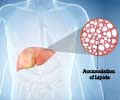The association of serum lipids and malignant esophageal lesions might be modified by esophageal cancer family history.

A group of scientists from the Key Laboratory of Carcinogenesis and Translational Research, Laboratory of Genetics, Peking University Cancer Hospital and Institute; Hua County People's Hospital; and Anyang Cancer Hospital discovered a breakthrough in this field.
According to their pioneering study published in Chinese Medical Journal,the family history of esophageal cancer determines the association between serum lipids and risk of developing cancerous esophageal lesions.
Researchers analyzed data from the "Endoscopic Screening for Esophageal Cancer in China" trial including analysis of serum lipids like total cholesterol (TC), triglycerides, low-density lipoprotein cholesterol (LDL-C), and high-density lipoprotein cholesterol from 211 individuals with malignant esophageal lesions, and 2101 "control" individuals who didn't have the lesion.
Professor Yang Ke from Key Laboratory of Carcinogenesis and Translational Research, Laboratory of Genetics, says, "We found that the association of serum lipids and malignant esophageal lesions might be modified by esophageal cancer family history. This finding provides population-level evidence in research at the interface of serum lipid biology and esophageal carcinogenesis” .
Though initial analysis of data shows no consistent association between serum lipid levels and risk of developing malignant esophageal lesions, stratified analysis of data in terms of those with and without esophageal cancer family history gives better understanding.
Advertisement
Advertisement














